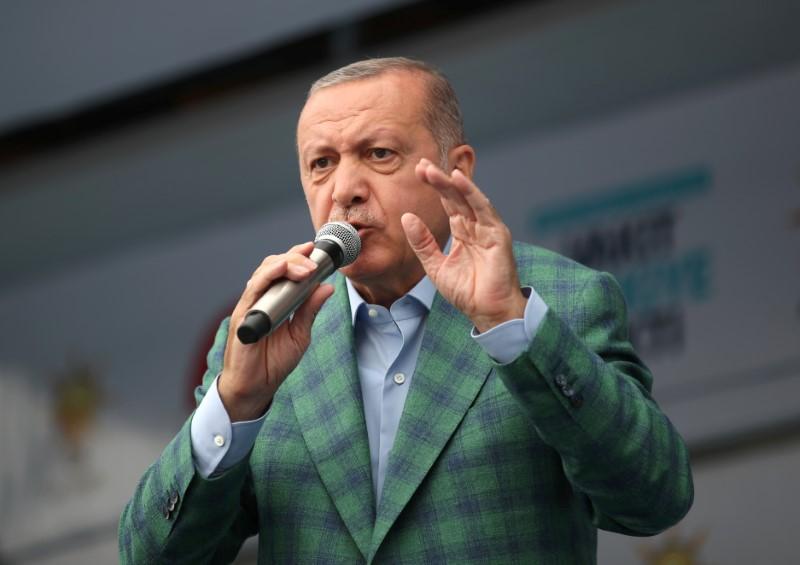Subscripe to be the first to know about our updates!

Erdogan’s Economic Woes Grow Ahead of Key Elections in Turkey
Dorian Jones
The Turkish economy has fallen into recession for the first time in a decade, according to data released on Monday. The timing could not be worse for President Recep Tayyip Erdogan with critical local elections scheduled for the end of the month.
According to state figures, the gross domestic product shrank by 2.4 percent in the last quarter, a sharper contraction than most predictions. The previous quarter saw a 1.6 percent decline, heralding two successive quarters of negative growth — the definition of a recession.
The Turkish economy is still reeling from the aftermath of last year’s currency collapse, triggered by U.S. President Donald Trump hitting Ankara with sanctions over the detention in Turkey of American pastor Andrew Brunson, who has since been released.
While the sanctions lasted only a few weeks, the currency crashed by around 30 percent, unleashing a wave of inflation, still running at around 20 percent. To stabilize the lira, Turkey’s central bank increased interest rates to 24 percent, one of the highest rates in the industrial world, strangling economic activity.
Turkey now faces stagflation, recession, and surging inflation. This comes at an inopportune time with Erdogan seeking to maintain ruling party control of Turkey’s largest cities in local elections on March 31. Opinion polls indicate the economy is the No. 1 concern for voters, an indication that the ruling AKP could face major losses across the nation.
Berat Albayrak, Turkey’s economy czar and Erdogan’s son-in-law, sought to put a positive spin on the latest economic data, maintaining that the worst was over. The problem “has been successfully dealt with in a very short space of time,” tweeted Albayrak.
While in the past Turkey’s economy has been resilient by recovering quickly from shocks, analysts warn this time it may be different.
“The biggest challenge is the extent of the debt buildup in the run-up to the exchange rate shock in August,” said economist Inan Demir of Nomura Securities.
“This is a key difference compared to the past shocks,” added Demir, “when the private debt burden was much lower. The deleveraging pressures (i.e., pressures to pay down debt accumulated earlier) will slow the pace of recovery.”
Taking advantage of worldwide low interest rates and unprecedented levels of liquidity, Turkey’s corporate sector and consumers have built up massive liabilities.
Over the past 10 years, the economy surged on debt-fueled growth. In 2017, the economy grew at a rate of 7 percent, one of the strongest in the world.
Now, Turkey’s construction sector is among the most heavily indebted. According to the latest figures, it contracted by 8.7 percent in the last three months. The industry, which is closely linked to Erdogan, is among the most labor intensive and a critical driving force behind the country’s unprecedented period of economic growth.
Turkey’s economic woes could worsen over renewed diplomatic tensions with the United States. Washington is warning of sanctions if Ankara goes ahead with the procurement of Russian missiles, which NATO warns is a threat to their weapons systems.
“Unfortunately, we see the makings of a new Brunson-scale crisis in the clash over Turkey’s determination to purchase Russian made S-400 anti-missile systems,” said Atilla Yesilada of Global Source Partners. “The U.S. and NATO ratchet up the pressure now, essentially threatening Erdogan with another currency meltdown,” added Yesilada.
Erdogan, however, is refusing to heed Washington’s warnings, insisting on continuing with the S-400 purchase. Analysts say standing up to America plays well with voters and Erdogan is likely banking on his relationship with Trump to avoid a crisis.
“I would think these are significant risks that could generate significant currency volatility again,” said Demir. “But my impression is that the markets are not focusing on these issues currently, perhaps relying on the assumption that an agreement can be found between Presidents Trump and Erdogan.”
The apparent belief in the Trump-Erdogan relationship by international markets is seen as a key factor in why the lira has remained relatively stable despite rising U.S.-Turkish tensions. The Turkish public, however, appears less certain, selling lira for foreign currency.
“In the year through March 1, they (public) appear to have built up some $6 billion in F/X (foreign exchange) deposits in total, which suggest, among other things, they see relative lira stability to date as a temporary phenomenon,” said Yesilada.
With nearly three weeks left to Election Day, and the polls indicating all of Turkey’s main cities hang in the balance, analysts say Erdogan is likely to continue to ramp up populist rhetoric since he has been denied his usual economic prosperity card.
Economists warn such a strategy carries with it the threat of further economic pain.
“The main vulnerability is to another external shock, such as geopolitical or a surge in dollar vis-a-vis all currencies,” said Demir. “In the case of another major fall (in the currency), the economic downturn will be prolonged.”
Source; Voa News